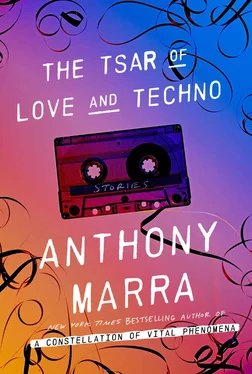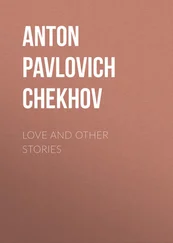We dressed in our finest clothes that Wednesday in 1906 and took the train from Pavlovsk to Petersburg to the photographer’s studio. It had been our mother’s idea, as most good ideas were. A portrait, by camera rather than paintbrush, would convey in a single image the forward-looking optimism she had spent her life enacting. Peacock plumage roosted on my mother’s head. In the photograph, it is dishwater gray. I stand in front of her with a faint smile. Not even the noose of my necktie strangled the excitement of having my picture taken. And beside me, wearing a matching necktie, a matching smile, his cowlick roughly brushed, his broad face whittling to a slender nose, my brother stood stiffly, gazing through the lens, through time, to meet my eyes as I sat framed between the agents who had executed him.
After leaving the photographer’s studio, my parents had taken us to the Petersburg Zoological Gardens. It had been a terrible decade for the zoo — the grounds had been largely abandoned and many of the cages were empty — but I was a child, and didn’t understand what the empty cages meant. What still lived in that zoo was a revelation. I had never before spied an animal larger than a milk cow, more ferocious than a hungry dog. Who could have imagined a beast as strange and melancholy as a giraffe? But of every animal we saw that afternoon, I remember none more clearly than the leopard. Loose-limbed and lanky. Nostrils spouting narrow triangles of steam. Claws clicking coded messages across the concrete floor. Eyes all pupil. Each step unfurling through the spine. An inconceivable creature at which Vaska and I first marveled, then threw bread crumbs.
“You recognize this, I’m sure,” the senior agent said, nodding to Vaska in the portrait. “I trust you know who to correct.”
By this point I had moved from India ink to airbrushing. It was no longer enough to obliterate a traitor’s face; the inky mask acknowledged that a traitor could exist, an assertion that quickly becomes a traitorous act in itself. History is the error we are forever correcting.
The senior agent guided me to my workbench.
“Is it necessary to do this now?” I asked.
“The work of building socialism never ceases. It doesn’t take leisure hours.” He frowned at my dessert on the table. “It doesn’t eat sugar plums.”
I flattened the photograph, loaded the paint into the airbrush like a bullet into a pistol. With the patience of an Ottoman miniaturist, I corrected my brother. I began with his black leather shoes, slowly dissolving them into the floor they stood upon. Then his stockings and breeches. Our father stood behind him, and with slow, even strokes, I airbrushed an approximation of our father’s trousers over my brother, so it seemed I was not erasing Vaska but folding him in our father’s clothes, where he would stay safe and warm, his skin pressed to our father’s. I remembered drawing him when we were children, paying him in sweets to sit for me when he was angry, tearful, exhausted, contrite, merciful, joyous. I had never felt closer to him than when I had felt some essence of his soul pressing its way through the pencil to the page.
When my brother’s face disappeared into my father’s dress shirt, I looked to the boy standing beside him, and wondered what judgments he cast as he stared through the lens and into the future where he met the gaze of the man he had become, and I knew then, beyond doubt, that I had sealed myself to the state, that my faith had become unshakable, my loyalty unimpeachable, because if this was wrong, if we did this in vain, all the water in the Baltic wouldn’t be enough to cleanse us.
I passed the corrected photograph to the senior agent when I finished. He hadn’t taken his eyes from me the entire time.
“You know what they’re saying about you?” the agent asked, holding the photo to the light.
“What do they say?” I asked.
“That it takes less talent to dredge a face from oblivion than to cast it back. In that sense, you are a genius of a certain kind.”
THREE weeks have passed since I corrected the dancer. Several times I have tried to correct her hand, to slip the image back into its file, but Maxim’s watchful eyes never leave me, I cannot retrieve the airbrush from our office, and what’s more, the file has already been returned to NKVD headquarters.
There has been no mention of the missing photograph, and given the deluge of erroneous images, it has likely been overlooked and forgotten. But something is happening. People keep their eyes fixed roadward, afraid to speak or glance about. One evening at a restaurant, I pulled out my notebook to sketch an elderly man hunched over his soup bowl. Within two minutes everyone sitting at the poor man’s table had quietly left. Twice this week I’ve woken to raids on the floor below me; the NKVD works at night, as is typically the case with murderers. The stacked boxes of erroneous images grow ever taller, threatening to topple and crush us as we work. I ask Maxim what he has heard.
“There is talk that the security organs have uncovered a Polish diversionist-espionage network.”
“I salute the vigilance of our state police,” I say. What a relief. I am not Polish. I have no relations or friends who are Polish.
“Saboteurs and kielbasa are Poland’s only exports,” he says, winking. “The NKVD will take care of the saboteurs, but you and me, we should take care of the kielbasa!”
“I have no desire for foreign sausages of any kind. If I ever hear another remark about Polish meat products I will report you.”
Maxim’s smile wilts and a surprised hurt sinks into his eyes.
We get to work. Over the past few weeks, Maxim has shown an interest in the mechanics of airbrushing, even asking me to explain linear perspective and my personal theories regarding the submersion of a subject into the background. To my pride and dismay, he’s gotten rather good. The light of socialism burns bright enough to illumine even his brutish soul.
From our office, we hear the tick-tock of pickaxes, the gears of immense machines grinding forward. The construction never ceases. Working in twelve-hour shifts, the crews excavate the bedrock, cart-haul the debris, raise tunnel walls, lay ties and rail beams. At this rate, the entire metro system will be built before our work is finished. When Maxim and I break at lunch, I wander through the unlit tunnels. Each day I tell myself to walk farther, but in the darkness, with no unit of measurement but footsteps, distance becomes an increasingly futile concept. I doubt I will see the end.
When I return, Maxim is beaming. “I finally have a rendezvous with a certain blue-eyed secretary from the New Metal Institute this evening,” he says. “I’ve been courting her for months.”
“We’ll be working late tonight,” I inform him.
“But you said I could leave early tonight.”
“New developments have arisen.”
“But…”
“The work of socialism doesn’t pause for secretaries of any eye color,” I say. Poor Maxim. His misery is among the few indulgences I allow myself.
At twenty-two hundred hours, I surface to a tar-black night. December has come. If I maintain my current work schedule, I won’t see the sun until April.
My cleaning woman has left my meal on the stove, but I take only a glass of plum brandy and retire to the living room. I set a record on the gramophone and collapse into the comforting depression between the second and third divan cushions. I retrieve the rolled photograph of the dancer from the hollowed coffee table leg. A spot-lit hand, and below, her partner dancing onstage alone. I remove my spectacles and set them on the side table. Like ice cubes melting in a glass, the furniture loses its edges, and I nestle into the cushions, and sip plum brandy as the notes creak through the gramophone, and I feel fine, feel freed from the heaviness of sight, and a waddling oboe enters, and I imagine the dancer onstage, the whole of her, and I extend my hand but cannot see to the end of my wrist, see only a floating blankness that could be hers as easily as mine.
Читать дальше












